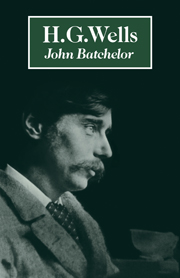Book contents
- Frontmatter
- Contents
- Preface and acknowledgements
- List of abbreviations
- 1 The romances of the 1890s: The Time Machine, The Island of Dr Moreau, The War of the World
- 2 The Edwardian achievement, I: Love and Mr Lewisham, Kipps, The First Men in the Moon, The War in the Air
- 3 The Edwardian achievement, II: Tono-Bungay, Ann Veronica, The History of Mr Polly
- 4 The decade of struggle: Mr Britling Sees it Through, Boon, ‘prig’ novels and discussion novels
- 5 Wells in the modern world: Mr Blettsworthy on Rampole Island, The Bulpington of Blup, The Croquet Player, dualism and education
- Conclusion
- Notes
- Chronology
- Index
3 - The Edwardian achievement, II: Tono-Bungay, Ann Veronica, The History of Mr Polly
Published online by Cambridge University Press: 18 December 2009
- Frontmatter
- Contents
- Preface and acknowledgements
- List of abbreviations
- 1 The romances of the 1890s: The Time Machine, The Island of Dr Moreau, The War of the World
- 2 The Edwardian achievement, I: Love and Mr Lewisham, Kipps, The First Men in the Moon, The War in the Air
- 3 The Edwardian achievement, II: Tono-Bungay, Ann Veronica, The History of Mr Polly
- 4 The decade of struggle: Mr Britling Sees it Through, Boon, ‘prig’ novels and discussion novels
- 5 Wells in the modern world: Mr Blettsworthy on Rampole Island, The Bulpington of Blup, The Croquet Player, dualism and education
- Conclusion
- Notes
- Chronology
- Index
Summary
The Sea Lady, The Food of the Gods, A Modern Utopia
A recent critic of Wells rightly remarks that he was one of the first literary figures of any stature in England to shape himself into a ‘Modern’ (in the simple historical sense – ‘belonging to the Twentieth Century’ – rather than in the sense of the literary term ‘Modernist’), and that if we recall that he was a Victorian our admiration for his achievement is immediately enhanced (Reed, p. i). In the Edwardian period a contradiction becomes apparent between his declared objective of universal cooperation and his highly aggressive, individualist nature: ‘like a philandering priest, he could work honestly and diligently for the faith he could not keep’ (Reed, p. 8). Contradictions are found in all aspects of his life: he was against sexual licence, for instance, despite the licentiousness of his own life, and he was equally ambivalent about the past. Rural England exerts a nostalgic pull which is both attractive and potentially deadly; the past has to be fully understood – and at the same time vigorously resisted – before man can perceive clearly his own future. One of the earliest influences on Wells's thinking was Winwood Reade's The Martyrdom of Man (1872), a work which takes the full impact of Darwin's theory and sees man as a partially evolved creature struggling towards an inscrutable future.
- Type
- Chapter
- Information
- H. G. Wells , pp. 62 - 93Publisher: Cambridge University PressPrint publication year: 1985



